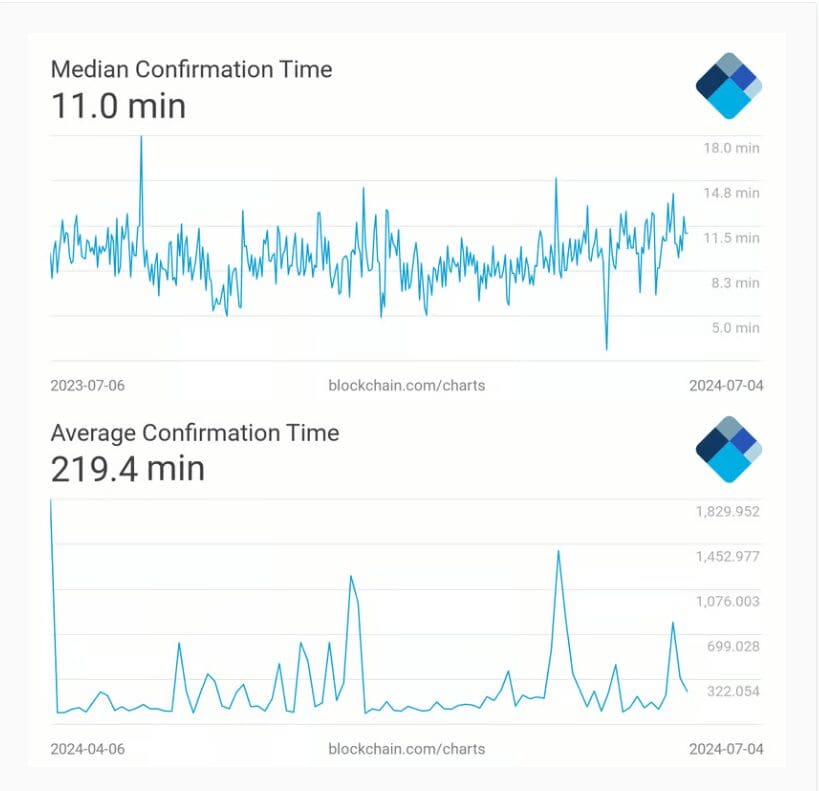In this article, I will explain How Long Does It Take to Send BTC. Being familiar with Bitcoin (BTC) transaction times is important for users as it entails network traffic, the fee charged, and the count of confirmations needed. These factors let you foresee and manage your Bitcoin transactions better.
How Long Does It Take to Send BTC?
From Blockchain.com, data estimates that Bitcoin had a median transaction time of 11 minutes. The transaction time on the other hand was much greater at 291 minutes (4 hours and 51 minutes) on average.
The middle of a range of transaction times is the median transaction time which suggests that there could be times longer than this as well as some shorter.

Average transaction time is the total time of all the transactions conducted divided by the total transactions done in that time period.
Outliers and network conditions get the blame for the noticeable gap between the median and average transaction times. For instance, the average gets skewed as some transactions take an extraordinarily long time to confirm, but the median indicates a user’s reality far better.
What Is The Average Number Of Confirmations For Bitcoin Transactions?
Every time a new transaction is done, it is Verified then added to the block to make the initial confirmation. At the end of every 10 minutes a new block is made which adds a second confirmation to the transaction. Some services like exchanges work with three or more confirmations while some work with only one.
Example Confirmation Requirements:
- Binance: 1 block confirmation for BTC deposits, 2 block confirmations for BTC withdrawals.
- Coinbase: Requires 3 block confirmations to finalize a BTC transaction.
Factors influencing Bitcoin transaction time
Network Congestion
Like a congested highway at rush hour, the Bitcoin network sometimes becomes congested during certain peak periods.
It can be more tricky than usual if ladders of tokens are piling up on the network. In such a scenario, your transaction facility will take comparatively longer to get processed.
Transaction Fees
Most importantly, the attached fee on your Bitcoin transaction has a significant effect on the speed of its confirmation. To lower fees, miners use a simple logic, complete all the unflattering jobs first.
Are you unconfirmed yet? Then, the payment is completed. Higher and more appealing payments lead to less waiting and more getting.
For regions where rigidity is promised during payment, there’s a chance that the funds remain untouched for protracted periods.
Block Confirmations
Every coin transaction has a distinct step which is the addition of the block to the chain. To ensure security needs, the network has instructions to carry out 1 to 3 confirmations prior to the completion of the command.
A block gets appended into the blockchain on average every 10 minutes. So, under typical circumstances, a transaction will last between 10 to 30 minutes.
But this is entirely reliant on the network alongside the open congestion level. Always remembering to add suitable payment is also a plus.
What Is The Time Taken To Confirm A Bitcoin Transaction?
Completing multiple confirmations is crucial for processing a bitcoin transaction. This step takes place to safeguard the transaction from a reversal as well as prevention of spending that has already been spent.

A confirmation is counted with every new block generation.
While Companies may ask for up to six confirmations for larger transactions, the truth is the time it takes in reality is more or less the same.
How To Make Bitcoin Transactions More Conveniently?
By providing a larger transaction fee, you can skip the line and speed up the time taken for the process to begin. Another simple way is conducting the transaction during rush hours to avoid congestion.
The Mempool size chart provided by Blockchain.com helps track the times where the unconfirmed transactions are at their lowest.
Will BTC transactions ever be faster?
The lightning network is a scaling solution that aims to solve this by building a second layer on top of the bitcoin blockchain that allows faster and cheaper micropayments.
Another option is to use other cryptos such as Ethereum or Litecoin which have faster transaction rates.
They trust this clarifies the confirmation of bitcoin transactions and the means by which it is possible to make the process quicker.
Conclusion
Ultimately, the duration to send BTC largely depends on the state of the network, the transaction fee, and even the confirmation needed. Some times the average transaction time can take anywhere from minutes to hours.
Learning and applying these variables can ease the process of transferring Bitcoin which in turn makes utilizing strategies like modifying fees or sending payments during off-peak hours easier.
With the progress of technology and scaling solutions such as the Lightning Network, it is anticipated that users willhave improved access to BTC. This will, without a doubt, boost the efficiency of Bitcoin in the future.









